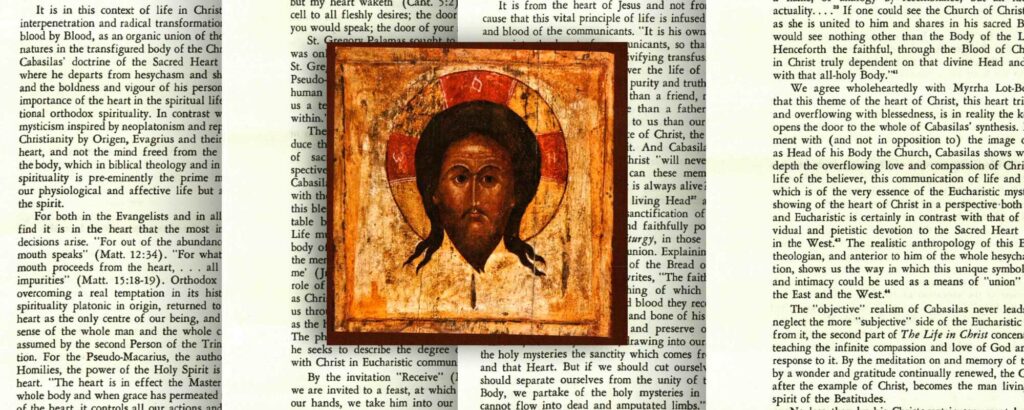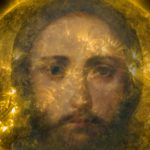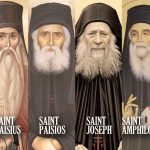
Teachings of Saint Nicholas Kavasilas: It is not necessary to become a monk
Saint Nicholas Kavasilas (1322) is best known for his books Life in Christ and Commentary on the Divine Liturgy. It has been thought that this Church Father was neither a monastic nor a married layman, though the introduction in The Life in Christ (SVS edition), suggests that the Saint became a priest in a monastery after his retirement. Whatever the case may be, the words of the Saint should be very refreshing and encouraging to any layman who is inclined to serve the Lord while living a celibate life in the world.
Source: Ο άγιος Νικόλαος Καβάσιλας, ΑΚΤΙΝΕΣ website, June 19, 2018. Translated from the Greek by Anthony Hatzidakis, Jun 20, 2023.
Saint Nicholas Kavasilas
By Konstantinos A. Economou
BIOGRAPHY
Saint Nicholas Kavasilas was born in 1322 in Thessaloniki, during an epoch of political decline in Byzantium, but at the same time, it was an epoch of the rise and flourishing of theological writings.
In this epoch, orthodox theology was greatly advanced within from the so-called hesychastic controversy.
The hesychastic teaching of Saint Gregory Palamas, which then began to dominate, focused on the potentiality of man to become a participant in the uncreated divine Light through his union with God and with His uncreated divine energies, grace of a purified heart and the Prayer of the Heart. The hesychastic teaching condenses the experiential understanding of the Orthodox faith on the deification of man. His teaching was followed by, among others, Saint Nicholas Kavasilas, who is also known as “the last of the Mystics.”
He was born in Thessaloniki and was the nephew of the Archbishop of Thessaloniki, Nilos Kavasilas. His father's surname was Hamaetos, but Nicholas decided to take the surname of his mother's brother. He studied rhetoric, theology, philosophy and natural sciences in Constantinople, where he stayed for a long time near Saint Gregory Palamas on Mount Athos, while he also was involved in political and legal subjects.
For a time he served as advisor to [Emperor John] Katakouzenos, who in the final years of his life was tonsured a monk in the Monastery of Mangana.
He developed an important collection of written work, gaining him universal respect and recognition.
He was a prolific author of respected theological, hermenutical, liturgical, ascetical and didactic works, as well as festal homilies, letters, epigrams and writings of social context.
After facing much danger on account of his views concerning Orthodox monasticism, which were in opposition with the heretical teachings of Barlaam and Akindinos, he fell asleep peacefully shortly after 1391 AD.
His numbering among the choir of Saints was made relatively recently on July 19, 1983.
His memory is celebrated on June 20th.
HIS TEACHING
Saint Nicholas Kavasilas was especially inspired from Saint Symeon the New Theologian and his neptic teaching.
His most important work is Life in Christ. Its simple but deep, lyrical, and its mystical character exhales the “dew” of the first Apostolic years. A saying characteristic of Saint Nicholas is the following:
“The law of the spirit, which is the love for God, is the law of friendship and gratitude. In order to follow this law, it is not necessary to take up labors, nor to go away, nor to sweat. It is not necessary to leave your job or to withdraw to far-away places, to live a strange life and to wear a strange garment. You do not have to do all these things. You can stay in your home, and, without separating from your belongings, always be involved with the study of God and man, the study of the relationship of human beings with the divine, and with the study of every other such subject.”
Elsewhere the great neptic Father adds:
“First of all, preparations are not necessary for our prayer, neither a special place, neither voices when we call upon God. As there is no place where God is absent, it is not possible for Him not to be with us, since God is always much closer to those who call upon Him than their own heart is. He will come to us even if we are evil, because God is good.”
Saint Nicholas Kavasilas does not place much emphasis on the struggle with the flesh, neither does he deem external conditions and ways of life necessary (living as a hermit, or paying attention to clothing, etc.). Piety is the exclusive work, the governor of our internal disposition, the governor of our desires.
Therefore, what is significant in the teaching of Father Nicholas is that he does not see monasticism as a requirement for the spiritual life.
By staying within the daily social life, man can and is able to transform himself by studying lofty spiritual writings, which alone will facilitate the reorientation of his will towards to a higher spirituality.
His aim is to describe the Divine Grace, to simplify it, and to communicate it in some way to the common Christian – and this he does with a very strong theological spirit.
The life in Christ is the life of Christ, which enters within each one of us with a mysterious intimacy. He writes:
“It is natural for everything to be attached to itself more than with someone else. Nevertheless, our attachment to Christ is even stronger. Holy men perceive themselves attached more with the Savior than with themselves. Christ is at once our guest and our dwelling place. We breathe Christ. This is precisely what differentiates the New from the Old Testament, the presence of the Lord within us, Who is in charge of man’s soul and refashions it.”
Our sacred debt to the holy Father is that we should not extinguish our lamp within us, but to look within ourselves and discover the pure essence of virtue, the value of human nature and God’s love for man.
About this the Saint writes:
“Neither the temples, nor any other sacred thing is as holy as man, whose nature communes with God Himself, the One who will come sitting upon the clouds, who is a man and is certainly God. Each one of us can shine more than the sun, ascend to the clouds, fly toward God, approach Him, and labor so that God looks at him with sweetness.”
Moreover it is of great importance for the faithful to have self-knowledge, because with it:
“if a man considers the poverty in which he lives, while he has such a rich [human] nature, because he let himself be wrapped up in laziness and sleep, great sadness and many tears will accompany him throughout his life. But the day he makes his life as it should be, from being a fountain of hardship and tears, his life will then become a fountain of bliss and spiritual joy.”
With his arguments Kavasilas manages to discover the spiritual man not only in the hermit, but also in human nature itself, with which God communes, while calling every Christian to make the same discovery. Thus, from the asceticism of the body, the war against the flesh taught by the monastics of Nitria in Egypt, we ascend to the pure spiritual summit of the country of man. This is the greatest spiritual victory of Byzantium.
SPIRITUALITY AND SCIENCE
Kavasilas, while praising the depth and importance of the mystery of the life of a Christian was not an enemy of science because of this. He applied himself to astronomy with great zeal and was also involved with other sciences. His appreciation for science was so great that he reached a turning point to even call the saints, in truth, imperfect “because they did not receive from this world something good a human being has done, though they could acquire it; and whoever cannot motivate himself, but has the strength within him, is imperfect.”
And thus, with his teaching, he reconciles religious spirituality with the wisdom of this world.
Apolytikion of St. Nicholas (Kavasilas)
Fourth Tone. To the melody of Tachy Prokatalave.
As a godly instructor and an expounder most wise
the dogmas of faith you taught and sacred virtues as well,
O holy Saint Nicholas,
shedding light in the whole world
through your life and your teaching.
Wherefore Thessaloniki does now boast in your glory
and ardently now honors your most-revered memory.
Bibliography
- Ανδρόνικος Δημητρακόπουλος (1872). Ορθόδοξος Ελλάς: ήτοι περί των Ελλήνων των γραψάντων κατά Λατίνων και περί των συγγραμμάτων αυτών. Εν Λειψίαι: Μέτζγερ και Βίττιγ.
- Νικόλαος Καβάσιλας, κείμενο, μετάφραση Παναγώτη Χρήστου, Φιλοκαλία ασκητικών και νηπτικών, τομ 22, Πατερικές εκδόσεις, Γρηγόριος Παλαμάς, Θεσ/κη, 1979.
- B. N. Τατάκη, Ο Βυζαντινός Μυστικισμός.
- Nipsis: The quality of watchfulness or spiritual sobriety (Introductory note. The Philokalia, Vol. 3. St Philotheos of Sinai. Forty Texts on Watchfulness.)


